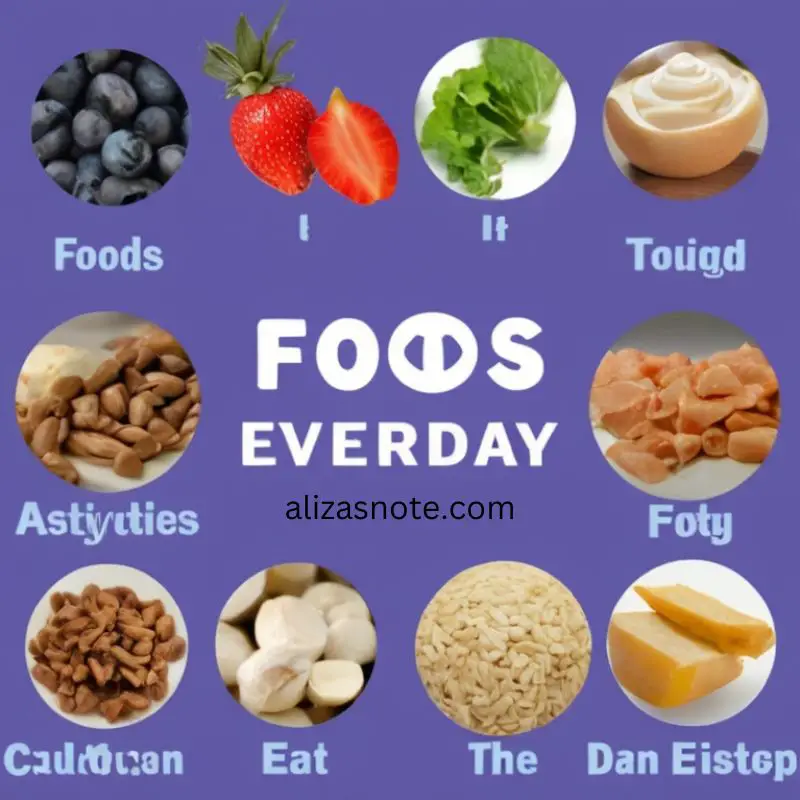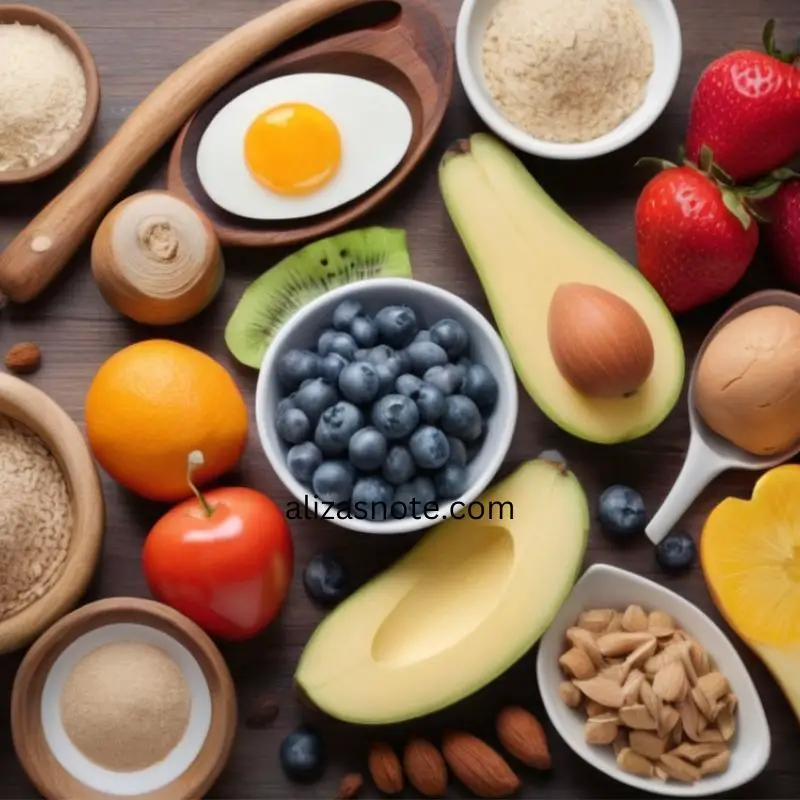20 Foods You Should Eat Everyday

The adage “you are what you eat”
Holds profound truth.
Nutritious your body with a various array of nutrient-rich foods is the keystone of a balanced and vibrant life.
Welcome to my exploration of the 20 Foods You Should Eat Every Day – a serious list that goes beyond mere sustenance to find the power of nutrients that can positively impact of well-being.
In this blog article, I’ll disclose some fruits and vegetables that paint our plates with antioxidants to the wholesome grains that fuel our bodies with fiber, and the lean proteins that sculpt our muscles – these 20 foods are a symphony of taste and nutrients, designed to raise the daily diet.
Join me as I unravel the nutritional wonders of berries, the robustness of leafy greens, the nourishing embrace of whole grains, and the power of proteins that aren’t just ingredients; they are culinary alchemists, transforming your meals into a celebration of health and vitality.
So, let’s elaborate on these 20 foods bring to our plates and relish the life-journey toward a healthier, happier you.
Necessary Food Groups
For a balanced and nutritious diet includes incorporating foods from various essential food groups. These groups serves a wide range of nutrients necessary for optimal health. Lets go.
1. Fruits:
Berries, apples, oranges, bananas, kiwi.
Benefits: Rich in minerals, vitamins, fiber, and antioxidants.
2. Vegetables:
broccoli, Leafy greens (spinach, kale), bell peppers, carrots
Benefits: High in and antioxidants, fiber, vitamins, minerals, low in calories.
3. Whole Grains:
whole wheat, brown rice, Quinoa, oats.
Benefits: vitamins, complex carbohydrates, Excellent source of fiber, and minerals.
4. Proteins:
Tofu, Lean meats (chicken, turkey), eggs, fish, beans, lentils.
Benefits: Immune function Essential for muscle repair and growth, and overall body maintenance.
5. Dairy or Alternatives:
Milk, cheese, yogurt, cheese (or plant-based alternatives like soy milk, or almond milk).
Benefits: Rich in calcium, vitamin D, and protein for bone.
6. Healthy Fats: Olive oil, seeds, Avocado, nuts.
Benefits: Aid in the absorption of fat-soluble vitamins, provide essential fatty acids, support brain health.
7. Lean Proteins:
Tofu, Beans, Poultry, fish, legumes.
Benefits: Essential for muscle health, Low in saturated fats, and can assist in weight management.
8. Desserts :
Fruits, Dark chocolate, natural sweeteners.
Benefits: Healthier options to satisfy sweet cravings.
9. Hydration:
Herbal Teas, Water
Benefits: Digestion, Essential for overall bodily functions, and helps maintain energy levels.
10. Herbs and Spices:
Basil, Garlic, ginger, turmeric.
Benefits: Enhance flavor; also have health benefits.
20 Foods You Should Eat Everyday:
1. Blueberries:
Rich in antioxidants, fiber, vitamin C, and. Supports cognitive function, heart health, and reduces oxidative stress.
Nutrition (per 100g): 39 calories, 1g protein, 10.3g carbs, 1 fiber, 0.1g fat
2. Spinach:
vitamin K, High in iron, and folate. Red blood cell production, active for bone health, and overall immune function.
Nutrition (per 100g): 17calories, 1g fiber, 0.5g fat 1.3 protein, 2.4g carbs.
3. Broccoli:
Vitamin C, Contains fiber, and antioxidants. Supports digestion, have anti-inflammatory properties and immune health.
Nutrition (per 100g): 49calories, 4.1g fiber, 0.1g fat, 2g protein, 10.1 carbs.
4. Avocado:
Potassium, Source of monounsaturated fats, vitamins E, C, and K, worth for heart health, skin, and immune function.
Nutrition (per 100g): 140 calories, 1g protein, 5g carbs, 5.7g fiber, 14.7g fat
5. Oats:
Manganese, Benefits: High in soluble fiber, and B-vitamins. Stabilizes blood sugar, supports digestive health, and provides sustained energy.
Nutrition (per 100g): 300 calories, 12.9g protein, 56.3g carbs, 8.6g fiber, 5.9g fat
6. Quinoa:
Aomplete protein source, and is rich in vitamins and minerals. Good for muscle health, digestion, and overall energy.
Nutrition (per 100g): 100 calories, 3g protein, 11.3g carbs, 1.8g fiber,0.9g fat
7. Salmon:
High-quality protein, omega-3 fatty acids, and vitamin D. Needful brain function, heart health and reduces inflammation.
Nutrition (per 100g): 196 calories, 10g protein, 0.1g carbs, 0.1g fiber, 9.4g fat
8. Eggs:
Excellent source of protein, vitamins B12 and D, and choline. Useful for muscle health, brain function, and overall energy.
Nutrition (per 100g): 50 calories, 4.5g protein, 0.1g carbs, 0.1g fiber, 2.8g fat
9. Greek Yogurt:
Probiotics High in protein, and calcium. Active bone health, gut health and provides a satiating snack.
Nutrition (per 100g): 48 calories, 6g protein, 1.6g carbs, 0.1g fiber, 0.1g fat
10. Almonds:
Protein, rich in healthy fats, and vitamin E. Provides energy, worth for heart health, , and may help control appetite.
Nutrition (per 100g): 300 calories, 9g protein, 18g carbs, 10.5g fiber, 45g fat
11. Sweet Potatoes:
Fiber, High in beta-carotene, and vitamins A and C. Supports immune function, eye health, and provides complex carbohydrates.
Nutrition (per 100g): 70 calories, 1g protein, 10g carbs, 1g fiber, 0.2g fat
12. Tomatoes:
vitamins C and K, rich in lycopene. Good skin health, and may have anti-cancer properties.
Nutrition (per 100g): 6 calories, 05 protein, 2g carbs, 2g fiber, 0.1g fat
13. Garlic:
Contains immune-boosting properties, anti-inflammatory and. Essential for heart health and may have antimicrobial effects.
Nutrition (per 100g): 120 calories, 5g protein, 20.1g carbs, 1.1g fiber, 0.2g fat
14. Chia Seeds:
Consistent of Enriched fiber, antioxidant, omega-3 fatty acids. Also considerable digestive health, heart health, and serves sustained energy.
Nutrition (per 100g): 236calories, 7.5g protein, 23.1g carbs, 224g fiber,21.7g fat
15. Turmeric:
Turmeric Contains anti-inflammatory and antioxidant properties. Very Supportive joint health, brain function, and skin diseases.
Nutrition (per 100g): 221 calories, 5.7g protein, 43.1g carbs, 17.7g fiber, 1.3g fat
16. Oranges:
Very High in fibe, vitamin C, and immune function, also for collagen production, and skin health.
Nutrition (per 100g): 43 calories, .9gprotein, 10.3g carbs, 1.3g fiber, 0.1g fat
17. Lentils:
Lentil is Excellent source of fiber, plant-based protein, and various vitamins and minerals. Also needful for digestive, bone, skin and heart health
Nutrition (per 100g): 100 calories, 4g protein, 11g carbs5g fiber, 0.1g fat
18. Bell Pepper:
My personal favorite contains vitamin C, fiber, and antioxidants. Very good for health, skin, and may reduce the risk of chronic diseases.
Nutrition (per 100g): 31 calories, 1g protein, 6g carbs, 2.1g fiber, 0.3g fat
19. Dark Chocolate (60-75% cocoa):
Antioxidants contains flavonoids and may improve mood. Get heart health and provide a bi-source of energy.
Nutrition (per 100g): 377 calories, 4g protein, 34g carbs, 16.5g fiber, 21.3g fat
20. Green Tea:
Green tea rich in antioxidants supports metabolism, and brain function, and may have anti-cancer properties.
Nutrition (per 100g): Calorie-free, proper antioxidants, and may contain a small amount of caffeine.
Why Variety into Meals
Variations into meals for maintaining a healthy and well-rounded diet.
Adding several of colors, flavors, and textures to your plate, diverse food choices ensure that your body receives a multi range of essentials. Each food item brings a unique set of vitamins, minerals, antioxidants, and other bioactive compounds, contributing to overall health, heart health, skin, hair, boosting the immune system, aiding digestion and vitality.
Additionally, grabbing a diverse diet reduces the risk of developing food sensitivities that can arise from repetitive food satisfying.
Trying new diet presences and recipes meet artistry to the kitchen and encourages truth relationship with food. It may bring sustainable eating plan, fostering long-term well-being.
Considerations and Adaptations:
Considerations is a crucial role to incorporating healthy foods into the daily meal plan.
Most consider factors such as personal presences, age, health conditions and activity level, when determining types of healthy foods. Individuals with allergies or dietary restrictions, be ensure to nutritional profile to compromising well-being.
You can prioritizing seasonal, budget-friendly, local productive alternatives contribute to a realistic and well-being eating plan.
Regular self-assessment and adjustments, further overview the nutritional slant.
By considering individual requires and making necessary adjustments, you can create a balanced and nourishing routine that aligns with personal goals, making health a lifelong and enjoyable journey.
FAQ:
Q1. Why these are must-have foods in daily diet?
Answer: These are offering a diverse array of vitamins, rich nutritional profiles, antioxidants, minerals, and other essential nutrients to boost health conditions.
Q2: Can I still maintain a balanced diet if I’m a vegetarian?
Answer: These list are ensuring to achieve a comprehensive and balanced nutritional intake for all, In fact who have food restrictions.
Q3: How can I incorporate these foods into my daily meals?
Answer: Indeed!
This not only keeps meals balances but also ensures a wide spectrum of power-nutrients.
Q4: Are these foods suitable for weight management?
Answer: Yes, these food list well-capable to weight management due to their nutrient properties. They boost overall mental and physical well-being.
Q5: Can I enjoy occasional indulgences while following this diet plan?
Answer: While these 20 foods form a pillar for a healthy diet, there’s room for flexibility. Following occasional treats in mid is part of a sustainable and balanced to nutrition.
Q6: what food should i be eating everyday
Answer: Follow the list above, and grab as healthy food for everyday life, Also you will able to customize your wants.
Thanks for reading! Let’s be buddy







